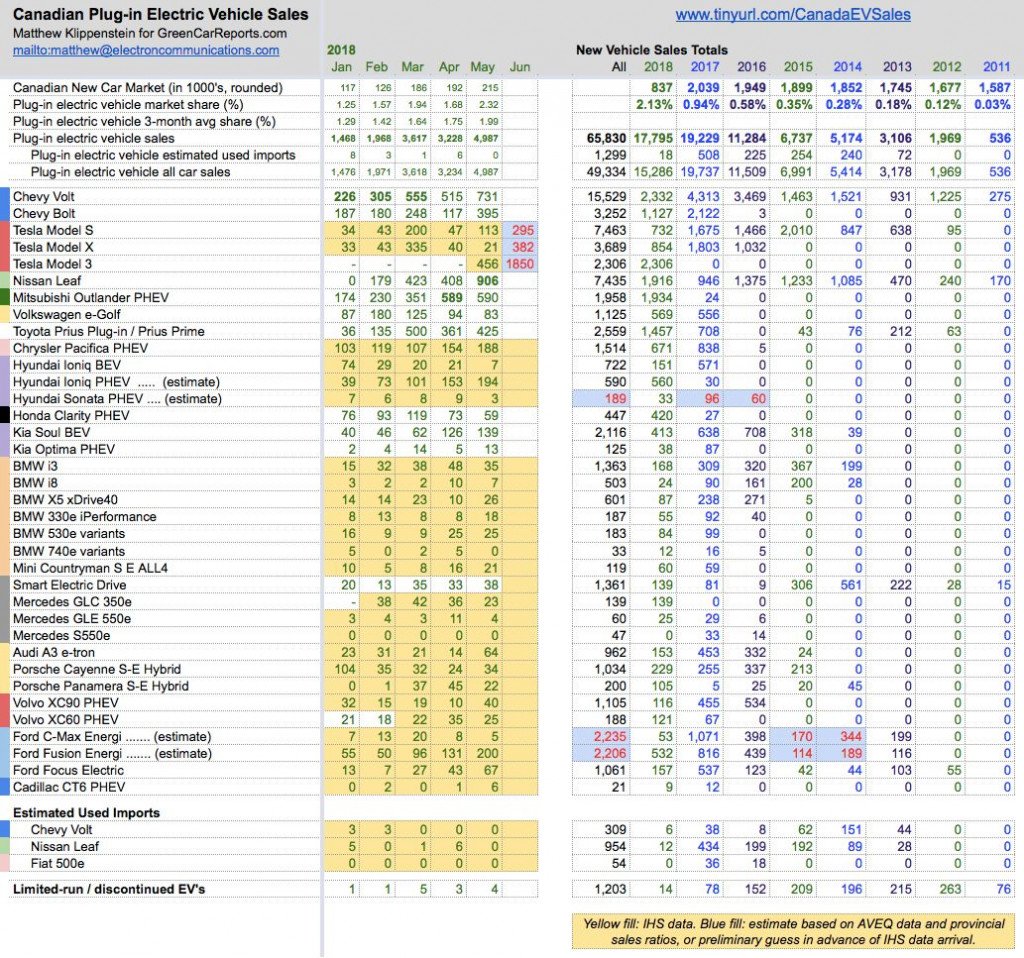Electric cars accounted for nearly 3 percent of all passenger vehicles sold in Canada in June, thanks to a surge of Tesla Model 3 deliveries.
With the California-based automaker famously coy about country-by-country deliveries, June delivery data won’t be finalized until later this month. (Several other automakers also decline to break out their plug-in electric vehicle deliveries.)
In the meantime, Green Car Reports has estimated about 1,850 Tesla Model 3 deliveries in Canada in June, along with deliveries of about 295 Model S hatchbacks and 382 Model X crossovers.
The Model S and Model X delivery estimates are in line with Tesla’s top single-month totals for each vehicle, on the assumption that some Model 3 reservation holders who didn’t make the first wave might have purchased one of Tesla’s other models. The derivation of the Model 3 figure has been described in earlier coverage.
DON'T MISS: Tesla Model 3: 456 sales in May Canadian debut
With Canadian new car sales of 200,156 vehicles in June, a total of 6,005 plug-in electric vehicle sales would be required for the sector to achieve 3-percent market share.
Whether they hit this milestone or not, if the industry’s plug-ins were treated as a single model, June sales data compiled by Good Car Bad Car suggests they would have been Canada’s fourth best-selling vehicle in June, behind the Ford F-Series, Ram pickups and the Honda Civic.
June sales reports
As for the Model 3’s competition, the Nissan Leaf notched 492 sales in June, down dramatically from May’s 906 units, but roughly in line with its monthly average of 481 units since the second-generation Leaf’s debut. Its 1,398 combined May and June sales alone exceed its previous best year in Canada; 2016 saw Nissan sell 1,375 first-generation Leafs to Canadian car buyers.

Plug-in vehicle sales in Canada, June 2018
Nissan’s Alliance partner Mitsubishi sold 479 Outlander PHEVs, down slightly from 490 in May but in line with its own four-month average of 502. (Canada’s car buying season starts in March, so four-month averages will generally offer the most representative comparisons.)
Toyota’s Prius Prime was the other member of June’s four hundred club, with its 413 sales in line with its own four-month average of 425. If the elimination of point-of-purchase plug-in electric vehicle rebates in Ontario causes would-be electric-car buyers to opt for conventional hybrids, Toyota may stand to benefit, having the broadest range of standard hybrids in its lineup
Chevrolet rang up 397 Volt and 306 Bolt EV sales in June. Both vehicles are set to break their respective annual sales records based on sales the first half of the year.
Among other reporting automakers, Kia sold 223 Soul EVs and 9 Optima Plug-In Hybrids, while Honda reported 168 Clarity Plug-in Hybrid sales. Volkswagen sold 53 e-Golfs, while 43 Canadians purchased Smart Electric Drives.
Green Car Reports has offered preliminary estimates for non-reporting automakers’ June vehicle sales (link, above), and will update figures when vehicle registration data arrives.

Plug-in vehicle sales and market share in Canada, June 2018
Final registrations for May
Canadians bought just short of 5,000 plug-in electric vehicles in May. Based on May sales data, if counted as a single model, plug-ins would have been Canada’s ninth-best selling model, lodged between the Toyota RAV4 (5,525 sales) and Ford Escape (4,963 sales).
IHS Markit data showed strong months from several non-reporting automakers helped with the achievement.
Ford sold 200 Fusion Energis, by far its best-ever monthly sales performance in Canada. With the C-Max being phasing out of North America, C-Max Energi sales have dropped to single digits, with five sold in May. The Focus Electric added 67 units to the Blue Oval’s electric total.
Chrysler added 188 Pacifica Plug-Ins in May; a strong June would allow the plug-in minivan to beat its full-year 2017 sales mark of 838 units at 2018’s halfway point.
Canadians also bought 6 Cadillac CT6 PHEVs.
Hyundai sold 194 Ioniq PHEVs and only 7 Ioniq Electrics in May, a wildly lopsided result that seems to confirm consumer research showing Canadian car buyers are far more open to plug-in hybrids than to full battery-electric vehicles.
A similar trend has been apparent for the BMW i3, whose range-extender version substantially outsells the battery-only version in Canada.
Hyundai also registered 3 Sonata Plug-In Hybrid sales.
CHECK OUT: Electric-car buyers want same things as all car buyers, research shows
Moving to the Teutonic automakers, BMW sold 35 i3 hatchbacks, 8 i8 sports cars and 26 X5 plug-in hybrid SUVs. It also sold 18 330e sedans, 25 530e sedans and 21 plug-in hybrid Mini Countrymans.
Mercedes sold 23 GLC 350e and 4 GLE 550e SUV plug-in hybrids.
Among Volkswagen’s stable of luxury brands, Audi sold 64 A3 e-trons while Porsche moved 34 Cayenne and 22 Panamera plug-in hybrids.
Finally, Sino-Scandinavian luxury brand Volvo sold 40 XC60 and 25 XC90 T8 Plug-in hybrids.












